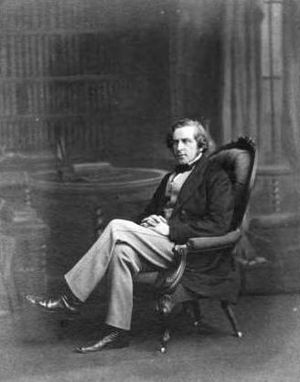James Halliwell-Phillipps facts for kids
Quick facts for kids
James Halliwell-Phillipps
|
|
|---|---|

Halliwell in 1863
|
|
| Born |
James Orchard Halliwell
21 June 1820 London, England
|
| Died | 3 January 1889 (aged 68) East Sussex, England
|
| Resting place | All Saints Church, Patcham |
| Nationality | British |
| Alma mater | Jesus College, Cambridge |
| Occupation | Scholar, author |
| Known for | Writing on William Shakespeare |
James Orchard Halliwell-Phillipps (born James Orchard Halliwell; 21 June 1820 – 3 January 1889) was a British scholar who loved old books and history. He was especially famous for his work on William Shakespeare and for collecting English nursery rhymes and fairy tales.
Contents
A Life of Learning
James Halliwell-Phillipps was born in London in 1820. He went to Jesus College, Cambridge for his education. From a young age, he was very interested in old writings and history.
Early Discoveries
When he was only 16, James started writing articles about literature. In 1839, he edited an old travel book called Travels by Sir John Mandeville. He also found and published a 15th-century poem called Torrent of Portugal.
Family and Challenges
In 1841, James met Sir Thomas Phillipps, who was a huge collector of books. James fell in love with Sir Thomas's daughter, Henrietta, and they decided to get married. However, around this time, James was suspected of having some old papers that might have belonged to the library at Trinity College, Cambridge. Because of this, Sir Thomas Phillipps did not approve of the marriage. Despite this, James and Henrietta got married in 1842.
Collecting Nursery Rhymes
James Halliwell-Phillipps loved collecting old stories and songs. In 1842, he published Nursery Rhymes of England. Later, he released Nursery Rhymes and Nursery Tales. This book included the very first printed version of Three Little Pigs and a version of the Christmas song The Twelve Days of Christmas.
Focus on Shakespeare
After 1845, James was not allowed to use the library at the British Museum because of the earlier suspicions about the old papers. This did not stop his work. He published a book about William Shakespeare's life in 1848. He also created a very special, limited edition of Shakespeare's plays.
He spent many years researching Shakespeare's life in great detail. He collected all the facts and documents he could find. He also helped buy New Place, which was Shakespeare's last home, for the town of Stratford-on-Avon. He also helped create the Shakespeare museum there.
Changing His Name
In 1872, James changed his name to Halliwell-Phillipps. He did this because of the will of his first wife Henrietta's grandfather. He was also very active in several historical societies, helping to publish many old English works.
His Legacy
James Halliwell-Phillipps passed away on 3 January 1889. He was buried in Patcham churchyard in East Sussex. His home, Hollingbury Copse, was filled with many rare books and items. He generously gave many of these valuable collections to libraries like Chetham's Library in Manchester, the Morrab Library in Penzance, the Smithsonian Institution, and the University of Edinburgh.
Major Publications
James Halliwell-Phillipps wrote and edited more than sixty books. Here are some of his notable works:
- (1840). The Connexion of Wales with the early Science of England.
- (1840). A Few Notes on the History of the Discovery of the Composition of Water.
- (1841). Shakespeariana.
- (1842). Cambridge Jokes: From the Seventeenth to the Twentieth Century.
- (1842). An Account of the European Manuscripts in the Chetham Library, Manchester.
- (1843). The Nursery Rhymes of England, obtained principally from oral tradition.
- (1843). A Collection of Pieces in the Dialect of Zummerzet.
- (1846). A Dictionary of Archaic & Provincial Words, Obsolete Phrases, Proverbs & Ancient Customs, From the Fourteenth Century, Volume I A-I
- (1847). A Dictionary of Archaic & Provincial Words, Obsolete Phrases, Proverbs & Ancient Customs, From the Fourteenth Century, Volume II J-Z
- (1847). An historical sketch of the Provincial Dialects of England, illustrated by numerous examples.
- (1848). Some account of the Vernon Manuscript, a volume of early English poetry preserved in the Bodleian Library.
- (1849). Notices of the History and Antiquities of Islip.
- (1849). Popular Rhymes and Nursery Tales: a sequel to The Nursery Rhymes of England.
- (1851). Notes on Ascertaining the Value, and Directions for the Preservation, of Old Books, Manuscripts, Deeds and Family Papers.
- (1854). Brief Observations on some Ancient Systems of Notation.
- (1855). Contributions to English Lexicography.
- (1856). A Catalogue of an Unique Collection of Ancient English Broadside Ballads, with notes of the tunes and imprints.
- (1859). An Introduction to the Evidences of Christianity.
- (1860). Notes of Family Excursions in North Wales, taken chiefly from Rhyl, Abergele, Llandudno, and Bangor.
- (1860). A Skeleton Hand-List of the Early Quarto editions of the Plays of Shakespeare; with notices of the old impressions of the Poems.
- (1861). Rambles in Western Cornwall by the Footsteps of the Giants; with notes on the Celtic remains of the Land's End district and the Islands of Scilly.
- (1863). A Calendar of the Records at Stratford-on-Avon
- (1864). An Historical Account of the New Place, Stratford-Upon-Avon, the Last Residence of Shakespeare
- (1866). A Hand-Book Index to the Works of Shakespeare: Including References to the Phrases, Manners, Customs, Proverbs, Songs, Particles, &c., Which Are Used or Alluded to by the Great Dramatist.
- (1884). The Stratford Records and the Shakespeare Autotypes. A brief review of singular delusions that are current at Stratford-on-Avon
 | Anna J. Cooper |
 | Mary McLeod Bethune |
 | Lillie Mae Bradford |

